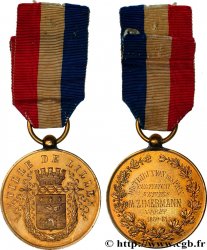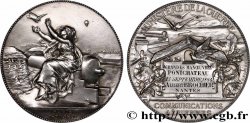E-auction 268-190694 - fme_370590 - III REPUBLIC Médaille de la Société des auteurs et compositeurs dramatiques
Чтобы принять участие в торгах, вы должны войти в систему и стать подтвержденным участником аукциона. Войдите, чтобы сделать ставку. Ваш аккаунт будет подтвержден в течение 48 часов. Не ждите до закрытия торгов, чтобы зарегистрироваться.Сделав ставку на данный товар, вы вступаете в юридическое соглашение на покупку выбранного товара и нажатием кнопки «Сделать ставку» подтверждаете принятие вами условий интернет-аукционов cgb.fr.
Ставка может бить сделана только в полном эквиваленте евро. Торги закроются согласно времени, указанному в описании товара, все ставки, сделанные после закрытия торгов, учитываться не будут. Не следует откладывать предложение вашей ставки до последнего момента, так как система может не успеть обработать вашу заявку, и ваша ставка не будет принята. Более детальную информацию вы найдёте здесь: FAQ по интернет-аукционам.
БЕСПЛАТНО.
БЕСПЛАТНО.
| Оценить : | 90 € |
| Цена : | 41 € |
| Максимальная предлагаемая цена : | 42 € |
| Конец торгов : | 04 June 2018 18:27:00 |
| Участников : | 6 Участников |
Тип Médaille de la Société des auteurs et compositeurs dramatiques
Дата: 1879
Монетный двор / Город: 75 - Paris
Металл: silver
Диаметр: 41,5 mm
Ориентация осей монеты: 12 h.
Гравер JALEY Louis (1765-1840) /
DUBOIS Alphée (1831-1905)
Вес: 39 g.
Век: lisse + corne ARGENT
Комментарии о состоянии
Superbe médaille avec une belle patine grise
Лицевая сторона
Аверс: легенда: ANÉPIGRAPHE.
Аверс: описание: Deux femmes vêtues à l’antique, devant un temple grec ; une lyre et un masque de comédie au sol.
Обратная сторона
Реверс: легенда: SOCIÉTÉ DES AUTEUR ET COMPOSITEURS DRAMATIQUES / UNIS ET LIBRES / 1879 // AURÉLIEN / SCHOLL/ SOCIÉTAIRE / FONDATEUR.
Реверс: Описание: Légende en quatre lignes dans un couronne de lauriers.
Комментарий
Cette médaille est à mettre en relation avec la fme_370589.
Signature au droit JALEY INV., pour Louis Jaley, né à Tours en 1765 et décédé en 1840, qui était un graveur-médailleur français. Il suit un apprentissage complet avant de devenir maître graveur et de prendre la suite de son père lui-même maître-graveur. La Révolution française, qui supprime les corporations, le prive de ses privilèges. Mais Louis Jaley décide de tenter sa chance à Paris où se spécialise dans les médailles commémoratives. Son atelier continue à prospérer. Il forme son fils qui devient ensuite l'élève de Pierre Cartellier. De nombreuses médailles de Louis Jaley sont exposées au Cabinet des médailles de la Bibliothèque nationale de France.
Aurélien Scholl, né à Bordeaux le 14 juillet 1833 et mort à Paris le 16 avril 1902, est un journaliste, auteur dramatique, chroniqueur et romancier français. Dès l'âge de quinze ans, il publie dans L'Echo Rochelais des feuilletons en vers, d'inspiration socialisante. Venu à Paris en 1851, il collabore à divers journaux éphémères pour se fixer au Figaro de 1857 à 1861. Passé par d'autres rédactions, il finit par créer en 1863 Le Nain jaune qu'il pose en concurrent du Figaro et dans lequel il écrit sous le pseudonyme de Balthazar.
Un riche mariage contracté en 1866 avec la fille d'un riche brasseur de Londres, installe Scholl dans le Tout-Paris et lui permet de laisser libre cours à son humour cinglant. Ses articles agressifs lui firent de nombreux ennemis qui lui vaudront plusieurs duels, dont un avec Paul de Cassagnac qui le blessera grièvement.
Dans les années 1880, il collabore à La Justice de Clemenceau ; ils eurent l'un et l'autre comme maîtresse, la comédienne Léonide Leblanc (1842-1894), qui fut également celle du Prince Napoléon et du duc d'Aumale.
Il crée le Quotidien de Paris dont le premier numéro parait le 12 mars 1884. Il est rédacteur en chef mais confie la direction à Valentin Simond, plus tard directeur de L'Écho de Paris. Le journal durera jusqu'en 1938.
En 1896, le guide Paris-Parisien le considère comme le dernier des « chroniqueurs étincelants »..
Signature au droit JALEY INV., pour Louis Jaley, né à Tours en 1765 et décédé en 1840, qui était un graveur-médailleur français. Il suit un apprentissage complet avant de devenir maître graveur et de prendre la suite de son père lui-même maître-graveur. La Révolution française, qui supprime les corporations, le prive de ses privilèges. Mais Louis Jaley décide de tenter sa chance à Paris où se spécialise dans les médailles commémoratives. Son atelier continue à prospérer. Il forme son fils qui devient ensuite l'élève de Pierre Cartellier. De nombreuses médailles de Louis Jaley sont exposées au Cabinet des médailles de la Bibliothèque nationale de France.
Aurélien Scholl, né à Bordeaux le 14 juillet 1833 et mort à Paris le 16 avril 1902, est un journaliste, auteur dramatique, chroniqueur et romancier français. Dès l'âge de quinze ans, il publie dans L'Echo Rochelais des feuilletons en vers, d'inspiration socialisante. Venu à Paris en 1851, il collabore à divers journaux éphémères pour se fixer au Figaro de 1857 à 1861. Passé par d'autres rédactions, il finit par créer en 1863 Le Nain jaune qu'il pose en concurrent du Figaro et dans lequel il écrit sous le pseudonyme de Balthazar.
Un riche mariage contracté en 1866 avec la fille d'un riche brasseur de Londres, installe Scholl dans le Tout-Paris et lui permet de laisser libre cours à son humour cinglant. Ses articles agressifs lui firent de nombreux ennemis qui lui vaudront plusieurs duels, dont un avec Paul de Cassagnac qui le blessera grièvement.
Dans les années 1880, il collabore à La Justice de Clemenceau ; ils eurent l'un et l'autre comme maîtresse, la comédienne Léonide Leblanc (1842-1894), qui fut également celle du Prince Napoléon et du duc d'Aumale.
Il crée le Quotidien de Paris dont le premier numéro parait le 12 mars 1884. Il est rédacteur en chef mais confie la direction à Valentin Simond, plus tard directeur de L'Écho de Paris. Le journal durera jusqu'en 1938.
En 1896, le guide Paris-Parisien le considère comme le dernier des « chroniqueurs étincelants »..








 Cообщить об ошибке
Cообщить об ошибке Распечатать страницу
Распечатать страницу Отправить мой выбор
Отправить мой выбор Задать вопрос
Задать вопрос Consign / sell
Consign / sell
 Информация
Информация



